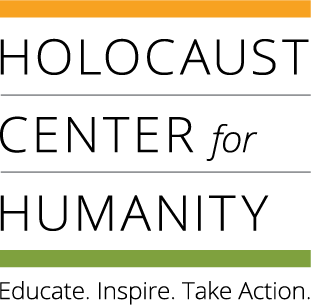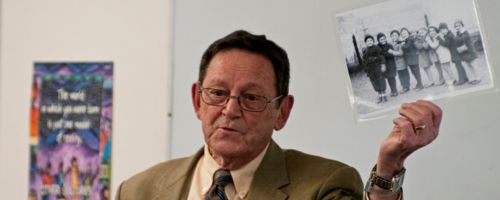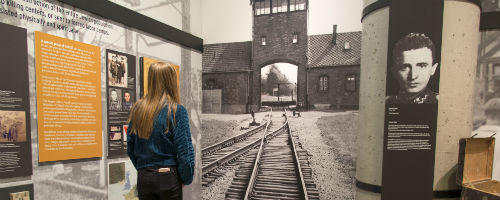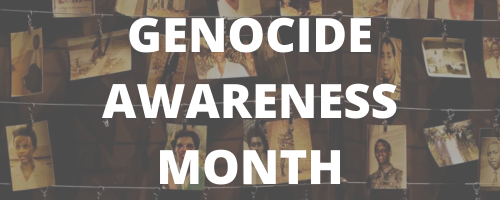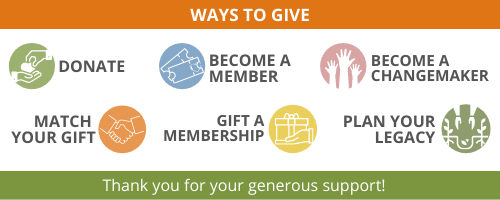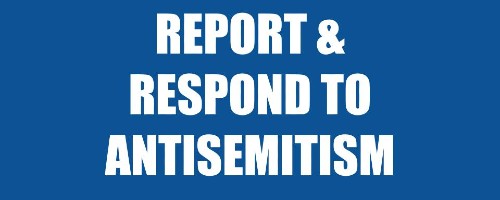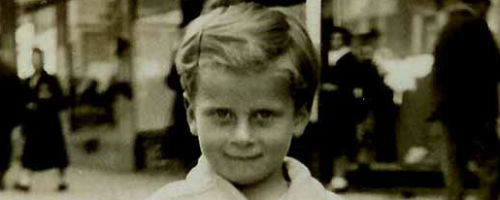
Image: Heinz Schwarz at the Space Needle, 1962. In 1940 Heinz Schwarz and his family fled from Berlin to Shanghai, China, a place that did not require a visa to enter. From there, he immigrated to Seattle, Washington, in 1948 at age 21. Donated by Heinz Schwarz. Read more about Heinz Schwarz.
Justice, Life, and Memory after the Holocaust - Lesson Plan
The purpose of this unit is for students to explore the concepts of justice, trauma, memory, memorialization, and human behavior. With a firm understanding of the events of the Holocaust, students are now tasked to understand the lasting effects the Holocaust has had on our understanding of human actions and how the way we remember the Holocaust impacts how we comprehend its meaning. This unit challenges students to find value in the study of the Holocaust and empower them to contribute to its memory today and in the future. From Echoes and Reflections. Approx 90-120 minutes. Go to Lesson.
Liberation - Lesson Plan
The purpose of this unit is to provide students with an understanding of the immense physical and emotional challenges faced by survivors during the period of liberation. The lessons explore these realities and the incredible will to live of the Jewish people as they embraced a “return to life.” The unit also examines the role of the liberators following the defeat of the Nazis at the end of World War II. From Echoes and Reflections. Approx. 60 minutes. Go to Lesson.
Complicity and Responsibility - Lesson Plan
The purpose of this unit is to provide an opportunity for students to examine the complex issues of responsibility and guilt on a personal level as well as on a national level within the context of the Nazi occupation of Europe. With a firm understanding of what happened during the Holocaust, students will now be tasked to examine, analyze, and evaluate the actions and responsibilities of some of the actors in the genocide of the Jews. Students will also explore and consider the responsibility of the democratic nations to provide safe haven for refugees attempting to escape Nazi persecution. From Echoees and Reflections. Approx 90-120 minutes. Go to Lesson.
Post-War: Chaos and Challenges - Reading
The victorious Allies were faced with difficult decisions. How would they treat Germany and other defeated Axis powers? What would they do about the millions of people displaced by the war who were now home less and often starving? Would it be possible to rebuild peace and stability in Europe? World War II ended up killing at least 19 million non-combatant civilians in Europe. Of those, 6 million were Jews, a full two-thirds of the pre-war Jewish population of Europe. For all those who remained, Jews and non-Jews, the end of the war did not bring an end to their problems. Reading and connection questions by Facing History and Ourselves. Go to Reading.
How to Bring Nazi Leaders to Justice? - Reading
Long before the war was over, the Allied powers began to discuss how to hold Germany accountable for its wartime actions. They agreed that Germany had violated several internationally accepted rules of war. If the Nazi leaders were to be put on trial, however, the question was: What specific laws had they broken? The Hague conventions of 1899 and 1907, signed by the United States and all major European powers, had defined several laws of war, including how prisoners and populations of occupied countries must be treated, but there had been no agreement on punishment for those who violated such laws, and no procedures for conducting international trials had been established. Article and critical thinking questions created by Facing History and Ourselves. Go to Reading.
Letters from a Dachau Liberator: Dr. David Wilsey
Captain David B. Wilsey, M.D., was a liberator of the Dachau concentration camp. He wrote numerous letters to his wife, many of which describe his observations, horror and anger. Students not only have access to these primary sources, including photographs, but there are suggested lessons and other resources provided.
In 2016, Clarice Wilsey donated the remarkable letters of her father, Captain David B. Wilsey, M.D., an army anesthesiologist present at the liberation of Dachau concentration camp, to the Holocaust Center for Humanity.
The Wilsey collection features 280+ letters, photographs, and more from Dr. Wilsey’s time in the U.S. Army, including the liberation of Dachau and experiences thereafter healing survivors. Researchers, historians, and students alike have found the letters extraordinary. Dr. Wilsey and his family were longtime residents of Spokane, Washington, and keeping this historically significant collection in the Northwest, at the Holocaust Center in Seattle, was a priority of the Wilsey family.
Although Dr. Wilsey rarely discussed his experiences at Dachau after the war, he wrote to his wife Emily in several letters in 1945 “to tell thousands so that millions will know what Dachau is and never forget the name of Dachau.” To pay homage to this, Clarice Wilsey continues to share her father's story as a member of the Center's Speakers Bureau.
Go to Wilsey Collection, including letters and photographs.
Perpetrators, Collaborators and Bystanders
This Echoes and Reflections unit provides an opportunity for students to examine the complex issues of responsibility and guilt within the context of the Nazi occupation of Europe. Students will also learn about the war crimes trials following World War II and consider the responsibility of the free world to provide a safe haven for refugees attempting to escape Europe. This unit also provides students with an introduction to Holocaust denial as a contemporary form of antisemitism. Go To Lesson
